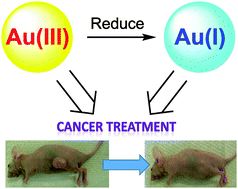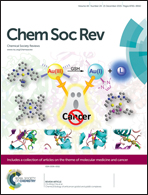Chemical biology of anticancer gold(iii) and gold(i) complexes
Abstract
Gold complexes have recently gained increasing attention in the design of new metal-based anticancer therapeutics. Gold(III) complexes are generally reactive/unstable under physiological conditions via intracellular redox reactions, and the intracellular AuIII to AuI reduction reaction has recently been “traced” by the introduction of appropriate fluorescent ligands. Similar to most Au(I) complexes, Au(III) complexes can inhibit the activities of thiol-containing enzymes, including thioredoxin reductase, via ligand exchange reactions to form Au–S(Se) bonds. Nonetheless, there are examples of physiologically stable Au(III) and Au(I) complexes, such as [Au(TPP)]Cl (H2TPP = 5,10,15,20-tetraphenylporphyrin) and [Au(dppe)2]Cl (dppe = 1,2-bis(diphenylphosphanyl)ethane), which are known to display highly potent in vitro and in vivo anticancer activities. In this review, we summarize our current understanding of anticancer gold complexes, including their mechanisms of action and the approaches adopted to improve their anticancer efficiency. Some recent examples of gold anticancer chemotherapeutics are highlighted.

- This article is part of the themed collection: Molecular Medicine and Cancer


 Please wait while we load your content...
Please wait while we load your content...